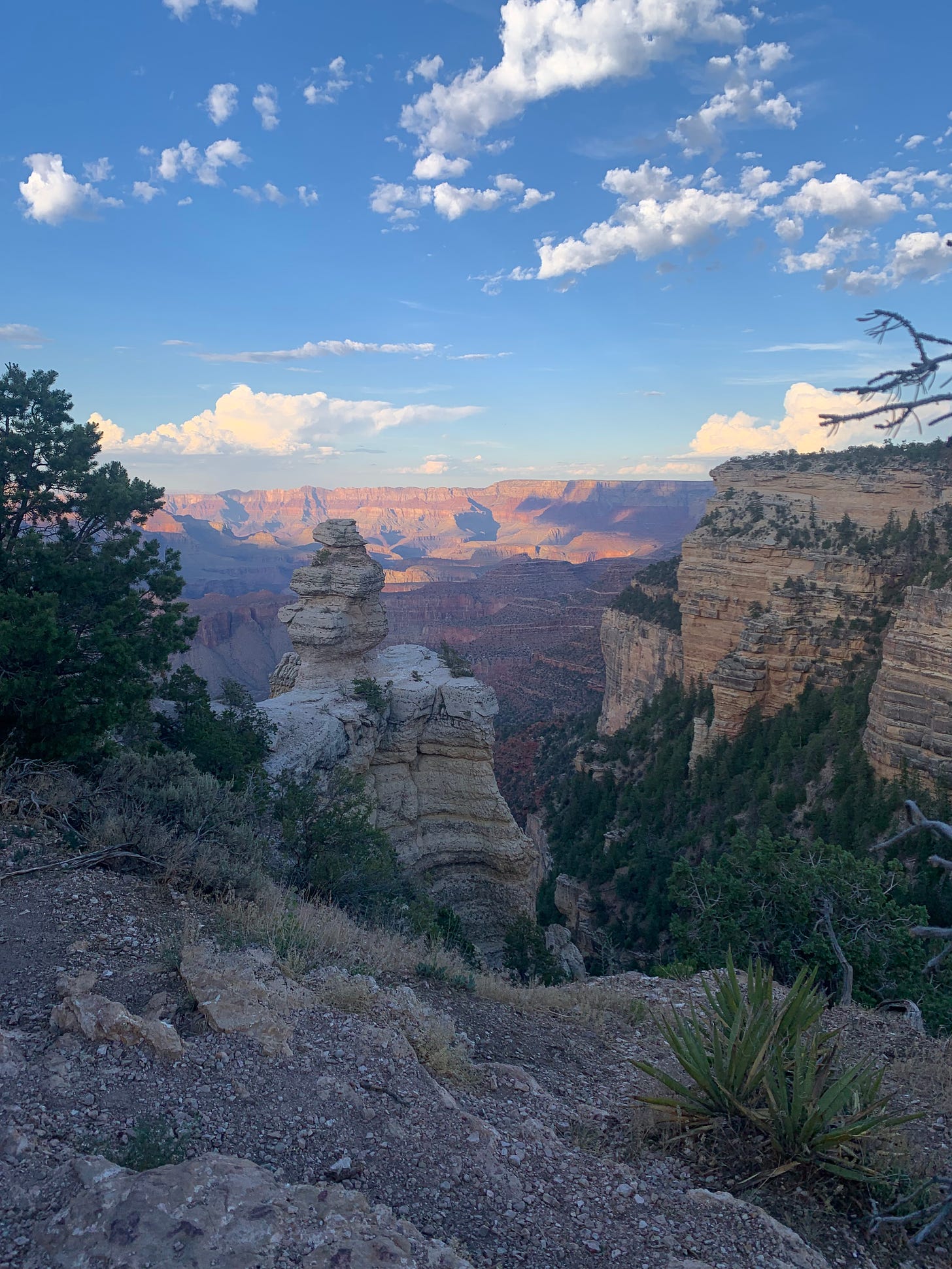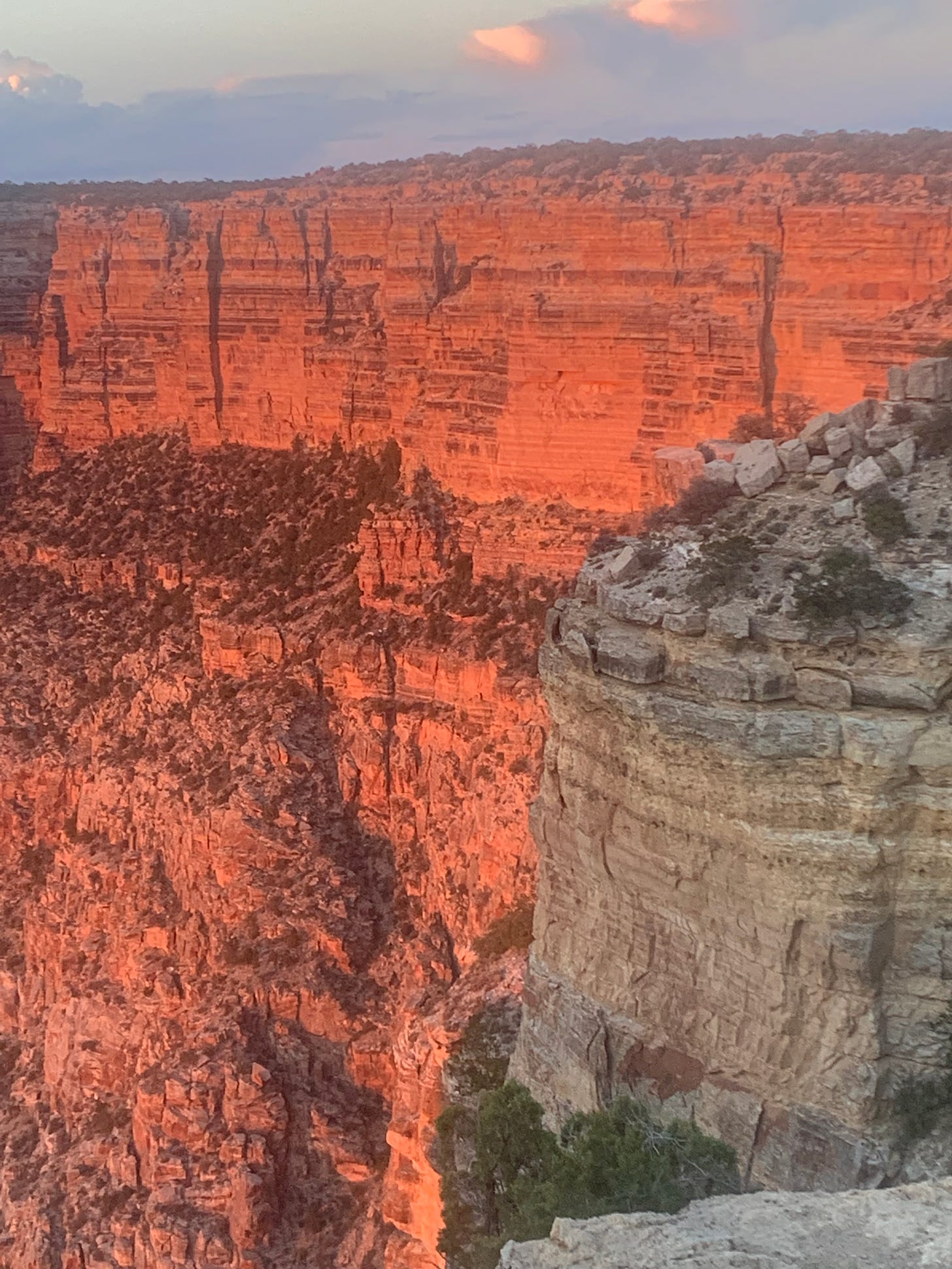Dear Reader,
When last I wrote, I announced that I’d be “spending the next week and a half working on a project that requires me to be incommunicado for the next week to ten days.” That “project” was a long-delayed family vacation. Because I picked this week to leave, staying off Twitter was impossible—I watched the Cassidy Hutchinson hearing on my phone, in my room at the Yavapai Lodge—but I did manage to be present with my wife and kids, and to enjoy myself.
I bought the plane tickets two and a half years ago. Originally, we were going to fly to Los Angeles in April of 2020, hit the theme parks. Quarantine scuttled that plan. I love L.A., I have a lot of friends there, but the idea of spending my vacation crawling along the 405 so my kids could hit various roller coasters filled me with both anxiety and dread. We decided to apply the vouchers—thanks, United, for making this work!—to a different destination. After flirting with London and [checks notes] Iceland, we landed on the Vegas-to-Grand-Canyon itinerary, which my wife had done twice before. I’d been to Vegas once, 21 years ago, right after we got engaged, but never to Grand Canyon. The kids hadn’t been to either place.
(One thing I learned about Grand Canyon is that, like Batman and Ukraine, it’s incorrect to use the definite article, although the uninitiated still do. Another thing I learned is that, before it was named Grand Canyon, it was called Big Canyon, which, while objectively true, does not quite convey the majesty.)
I don’t get away that much, and when I do, big things seem to happen. I was at Old Orchard Beach with my phone in a drawer during Charlottesville. I was in a lovely beach house in Ocean City, New Jersey, when the Mueller Report dropped. Would big things happen during this long-overdue vacation?
The answer was a resounding YES. There wasn’t even much suspense. Roe was overturned while we were still packing. We sat at the kitchen table, my wife and I, both feeling sick. Who felt like a holiday now? I could feel the dread in the pit of my stomach, the internalized doom of a democratic America. But staying home would have changed nothing.
Newark was overrun with travelers. I figured we’d check in early and have a pleasant dinner—on a trip to Berlin a few years back, I had one of the best burgers of my life at that airport. But there were no good restaurants in our terminal, and no place to even sit down. It took us a while to even find a place to eat. The food was mediocre and expensive. Our flight was delayed. The kids were irritated.
“As soon as the plane takes off,” I’d told my friends earlier in the week, “that’s when I’ll start to relax.”
But the plane took off, and I did not, could not, relax.
On the Strip, the billboards advertise the over-the-top shows coming to Vegas. Off the Strip, the billboards advertise remedies for erectile dysfunction, Jesus, and heroic attorneys to call if you injure yourself in a casino. A stranger to Las Vegas, reading just the billboards, would conclude that Sin City was a place where Christian gentlemen, unable to make it rise again, hurt themselves trying.
The city founded to extract every hard-earned dime from the lonely, sweaty dudes building Hoover Dam has always been tops at parting a fool and his money, but these days, Vegas is comically expensive. It is also comically inept at making sure you get your morning coffee easily—long lines, exorbitant prices, shitty product—which, I mean, don’t they want us all awake? I didn’t gamble, not even a stray turn of the gleaming slot machines, and still the casinos took all our money
Mandalay Bay is on the southern end of the Strip. From our room, you could see the whole gaudy expanse of it. I brought the binoculars my wife gave me for Father’s Day, and I sat at the window and took it all in:
It wasn’t until our second, and last, night in Vegas that I remembered that I was not the first hotel guest to look out over the Strip from a room at Mandalay Bay. The worst mass shooting in the history of the country was perpetrated here. From my perch on the 30th floor, I could see the site of the massacre, a parking lot where concert-goers gathered five years ago to take in the Route 91 Harvest Festival. Sixty people were gunned down during a Jason Aldean show. Sixty! Almost nine hundred were injured. The statistics make the mind reel. If ghosts didn’t haunt the Strip before, they certainly do now.
Vegas, Jesus, dick pills, aggressive personal injury attorneys, country music, all-you-can-eat buffets, slot machines, sports books, strip clubs, military-grade assault weapons, white male grievance, mass slaughter: This is America.
Beyond the city limits is desert. Rust and orange and brown, the palette of dryness and death. Lake Mead is a vision, the purest blue I’ve ever laid eyes on, the last blue thing for many miles. You have to see Hoover Dam, everyone says, but we don’t stop there. We are all eager to get moving, put Vegas behind us.
I don’t like the desert. It scares me. As my wife drives the rented SUV down the bumpy road that’s miles away from nowhere, I try and hide my extreme anxiety. I only ease up when we get to Kingman, where there are once again fast food restaurants and gas stations and bottled water for sale. We eat at a diner famous for its root beer.
The drive up the state highway to the south rim seems to go on forever. At last we come to the entrance to the national park proper. It costs $35 for the week—or about what I paid two days earlier for a large mojito delivered to me in the pool at Mandalay Bay at not quite ten o’clock in the morning.
Before we check in at the lodge, we head to Mather Point, so we can see what all the fuss is about. As soon as I behold Grand Canyon, I start to cry. The Stendhal Effect, I suppose. All of the tension and stress that I thought would leave me when the plane took off, but that had instead been growing all through the Vegas part of the trip, suddenly and unexpectedly evaporates. This isn’t a one-shot deal. Four more times during the trip, we head out from the lodge to look at the canyon. I cry all four times.
The second day there is a violent storm. The thunderclaps are earsplitting. Hail the size of marbles falls outside the window of the lodge. I have been to Arizona twice in my life. It rained like hell both times.
On the trip, I’m reading a novel my youngest got me for Christmas: All the Light We Cannot See. Beautifully written, wonderfully structured, it tells the story of a blind girl during the Second World War, who somehow finds herself safeguarding one of the great Golconda diamonds, the Sea of Flames, from an obese Nazi gemologist hot on her trail. (I’m two thirds of the way through it; no spoilers!) It contains this line, which jabs me directly in the heart, and seems appropriate to both the family vacation and the historical moment:
Open your eyes and see what you can with them before they close forever.
When the conquistadors came upon Grand Canyon, our tour guide says, they saw it only as an obstacle—a grand impediment to their travels. They were looking for gold, and in them thar hills, there is no gold. “They turned around and left,” he says, “and wrote that they found nothing of value here.”
Those are our American ancestors: occupiers from a distant land who cared only about money and personal glory and an interpretation of Christianity so severe that it birthed the Inquisition. People like that controlled the country then, and people like that control the country now.
Grand Canyon happens to be in the United States—in Arizona specifically—but we do not own it, not really. We are merely its custodians, like the Ancestral Puebloans who were the first human beings to inhabit that sacred place. Grand Canyon survived the conquistadors, and Grand Canyon will survive us. Long after we are dead and gone—we as in you and me, but also we as in all of humanity—when only the birds soaring overhead are left to appreciate its breadth and grandeur, Grand Canyon will still be there, as it was before recorded history.
They found nothing of value here. All their sanctimonious hue and cry about religion, and the conquistadors didn’t realize that standing on the south rim of that unequivocal wonder of the world, they were looking directly at the face of God.
ICYMI
The Five 8 returned on Friday—LB and I covered the events of the last two weeks, along with our guest, the journalist and Into the Raging Sea author Rachel Slade:







You have a beautiful soul Greg Olear. I wish there were more of you 💟🦄
A stranger to Las Vegas, reading just the billboards, would conclude that Sin City was a place where Christian gentlemen, unable to make it rise again, hurt themselves trying.
Sounds like the US Supreme Court to me.